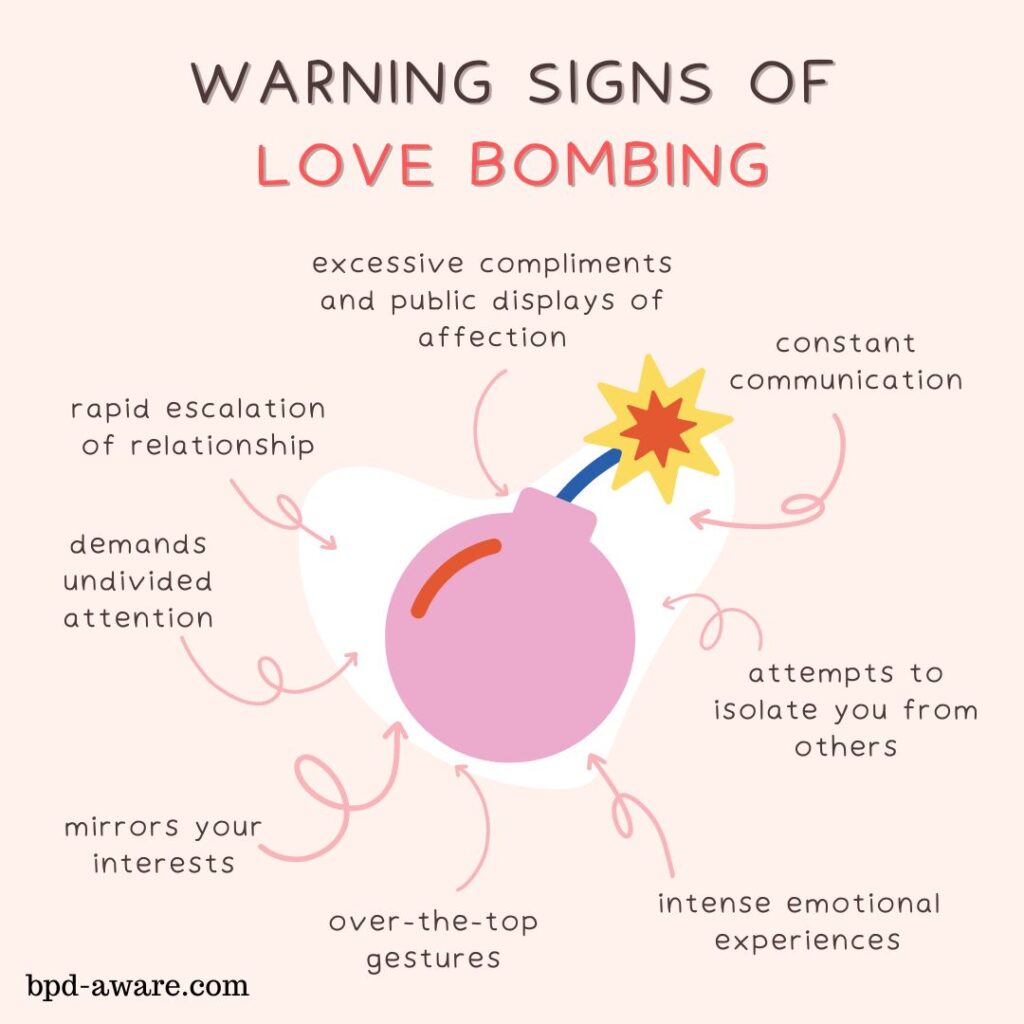Love bombing is a manipulative tactic often used in the context of a romantic relationship, though it can occur in any type of relationship. It involves overwhelming someone with loving words, actions, and behavior as a manipulation technique. Key characteristics of love bombing include excessive attention, admiration, and affection with the intent to make the recipient feel dependent and obligated to the person demonstrating these behaviors.
Love bombing, as a manipulative behavior, isn’t specific to any one personality disorder. It’s important to note that love bombing can be practiced by individuals with various personality types, and not everyone with a personality disorder exhibits such behaviors. However, certain personality disorders might be more associated with tendencies that could lead to love bombing, due to their characteristic patterns of thinking, feeling, and interpersonal functioning:
Borderline Personality Disorder (BPD): People with BPD can engage in love bombing, often driven by intense emotions and fear of abandonment. They may use love bombing to quickly establish a sense of security in a relationship. As a website that focuses on BPD, we will predominantly be talking about
Narcissistic Personality Disorder (NPD): Individuals with NPD often display a lack of empathy, a strong desire for admiration, and a sense of grandiosity. Love bombing can be a tool for narcissists to gain admiration and control in a relationship. They might use excessive flattery and attention to draw someone in and create a dependency, only to later assert control or devalue the person.
Histrionic Personality Disorder (HPD): People with HPD often display excessive emotionality and seek attention. While not typically manipulative in the same way as those with NPD, their desire for attention and approval could potentially manifest in behaviors that resemble love bombing.
Antisocial Personality Disorder (ASPD): Those with ASPD might engage in manipulative behaviors, including love bombing, to exploit others for personal gain. They often lack empathy and may use charm and flattery as a means to an end.
It’s crucial to understand that not everyone with these personality disorders will engage in love bombing, and not all instances of love bombing are indicative of a personality disorder. Love bombing is a specific manipulative tactic that can be used by anyone, regardless of their psychological makeup, to exert control or influence in a relationship.
Examples of Love Bombing
There are several methods of love bombing. Those who engage in this manipulative behavior typically use several of the tactics listed below:
Excessive Compliments and Flattery: The person constantly showers you with compliments and praises aspects of your personality, appearance, or accomplishments excessively and unrealistically.
Over-the-Top Gestures: Making grand gestures, like sending expensive gifts, planning extravagant dates, or making big promises about the future, especially early in the relationship.
Constant Communication: Insisting on constant communication through texts, calls, and messages, often expecting immediate responses and becoming upset or anxious if they don’t receive them.
Rapid Escalation of the Relationship: Expressing deep feelings, commitment, or talk of a serious future together very quickly after meeting, often declaring love or suggesting moving in together or marriage prematurely.
Isolation from Others: Encouraging or insisting that you spend all your time with them, leading to isolation from friends, family, and other support systems.
Demanding Undivided Attention: Expecting or demanding your undivided attention at all times, often becoming upset or irritated if you focus on other people or activities.
Using Affection as Leverage: Using affection and attention as a tool to influence or control your behavior, such as withdrawing affection if you do not comply with their wishes.
Creating a Sense of Indebtedness: Making you feel like you owe them something because of all they’ve done or given to you, leading to feelings of obligation.
Mirroring Your Interests: Adapting their interests, opinions, and personality traits to align perfectly with yours, creating a false sense of compatibility.
Excessive Public Display of Affection: Engaging in exaggerated public displays of affection, is often more about showing off the relationship to others than about genuine connection.
It’s important to note that not all gestures of love and affection are forms of love bombing. In healthy relationships, expressions of love are balanced, respectful of boundaries, and evolve naturally over time. Love bombing differs in its intensity, speed, and often manipulative intent. Recognizing these signs can help in identifying potentially unhealthy and manipulative relationship dynamics.

Do People With BPD Love Bomb?
People with BPD may engage in love bombing due to their intense emotional experiences and fear of abandonment, among other factors.
Love bombing in this context is characterized by showering someone with excessive affection, attention, and admiration in a way that can feel overwhelming. It’s important to remember that not all individuals with BPD engage in love bombing, but those who do may be driven by the following reasons and underlying mechanisms:
Intense Emotional Experiences: Individuals with BPD often experience emotions more intensely than the average person. When they enter a new relationship or develop strong feelings for someone, this intensity can manifest as love bombing, where they express their emotions in an overwhelming and all-consuming manner.
Fear of Abandonment: A core feature of BPD is a pervasive fear of abandonment. People with BPD might use love bombing as a strategy to quickly create a strong bond with someone, hoping to secure the relationship and alleviate their fears of being left or rejected.
Idealization in Relationships: In the early stages of a relationship, a person with BPD might idealize their partner and see them in an almost perfect light. This idealization can lead to love bombing, as they exaggeratedly express their adoration and admiration.
Seeking Validation: Individuals with BPD often struggle with feelings of emptiness and a poor self-image. Love bombing a partner can be a way for them to seek validation, reassurance, and to feel valued and loved.
Unstable Relationships: BPD is characterized by a pattern of unstable interpersonal relationships. Love bombing can occur as part of this pattern, where intense affection and admiration are given at the beginning of a relationship, which can later shift to devaluation.
Impulsivity: People with BPD can be impulsive and act based on intense emotions rather than rational thoughts. This impulsivity can lead to love bombing, as they might not consider the long-term consequences of their intensely affectionate behavior.
It is essential to differentiate between love bombing and genuine expressions of love and affection. Love bombing is typically manipulative and unsustainable, whereas healthy expressions of love are balanced and respectful of boundaries. For individuals with BPD, learning to navigate and express their emotions healthily is a critical part of managing the disorder, often achieved through therapies like Dialectical Behavior Therapy (DBT).
Understanding the motivations behind love bombing in BPD can help both individuals with the disorder and their partners to recognize and address these patterns in their relationships. Therapy can be beneficial in helping those with BPD develop healthier relationship skills and manage the intense emotions and fears that might lead to love bombing.
When People With BPD Are The Victims of Love Bombing
People with Borderline Personality Disorder aren’t always the perpetrators of love bombing, they can be the victims. This is particularly true when someone with BPD enters a relationship with a person with Narcissistic Personality Disorder.
The interaction between someone with BPD and a love-bombing narcissist can create a particularly toxic dynamic. The individual with BPD, driven by their emotional needs and fears, can become deeply entangled in the manipulative web cast by the narcissist. Recognizing these patterns is crucial for individuals with BPD to protect themselves from such potentially harmful relationships. Therapy, particularly treatments like DBT for BPD, can help individuals develop healthier relationship patterns and build resilience against manipulative behaviors like love bombing.
Manipulation Skills: Individuals with NPD are often skilled in manipulation. They can adeptly use charm and affection (as seen in love bombing) to win over and control their partners. This manipulation can be particularly effective against someone with BPD who yearns for affection and fears abandonment.
Feeding the Need for Validation: Narcissists often provide the excessive praise and attention that individuals with BPD crave for their unstable self-esteem. This dynamic creates a cycle where the person with BPD becomes increasingly dependent on the narcissist for emotional validation.
Creating Dependency: Narcissists often seek to create a sense of dependency in their relationships. For someone with BPD, the fear of losing the intense connection established through love bombing can make them more susceptible to staying in the relationship, even when it becomes unhealthy or abusive.

Disengaging from Love Bombing
If you believe you are being love-bombed then there are steps you can take to protect yourself and your mental health.
Recognize the Signs: Awareness is the first step towards protecting yourself and disengaging from manipulation. Recognize the signs of love bombing: the relationship is moving too quickly, intense declarations of love early on, extravagant gifts, and demands for your constant attention.
Set Boundaries: Establish and maintain strong personal boundaries. Be clear about your limits and communicate them to your partner.
Seek Support: Consult friends, family, or a therapist who can provide an outside perspective and support you in understanding the situation objectively.
Slow Down the Relationship: If you suspect love bombing, try to slow down the relationship. A genuine partner will respect your pace and boundaries.
Disengage If Necessary: If the relationship feels overwhelmingly manipulative and you see ongoing red flags, consider disengaging entirely. Prioritize your emotional well-being and safety.
Therapy and Healing: Professional help through therapy can be crucial in recovering from the emotional impact of love bombing. It can provide tools for healing and building healthier relationships in the future.
Final Thoughts
Love bombing, as a phenomenon, serves as a cautionary tale about the depths of emotional manipulation, but also as a call to foster genuine, respectful, and nurturing connections.
People with BPD can find themselves both vulnerable to love bombing and, in some cases, unknowingly engaging in it. Meanwhile, the perpetrators of love bombing, whether they possess traits of Narcissistic Personality Disorder or other manipulative tendencies, often exploit these vulnerabilities, creating a cycle that can be hard to break.
For those with BPD, recognizing the patterns of love bombing—whether as a recipient or a perpetrator—is a significant step towards empowerment. This awareness, coupled with therapeutic interventions like Dialectical Behavior Therapy, can equip individuals with BPD with the tools to establish healthier emotional boundaries and relationship dynamics.
Sources, Resources, and Further Reading
- Love Bombing: Signs to Look Out For: https://www.webmd.com/sex-relationships/what-is-love-bombing
- Signs and Stages of Love Bombing: https://www.psychologytoday.com/us/basics/love-bombing#signs-and-stages-of-love-bombing
- BPD Love Bombing: What to Know: https://www.talkspace.com/mental-health/conditions/articles/bpd-love-bombing/
- Do People With BPD Love Bomb in a Manipulative Way?: https://www.mentalcurve.com/post/do-people-with-bpd-love-bomb-in-a-manipulative-way
















